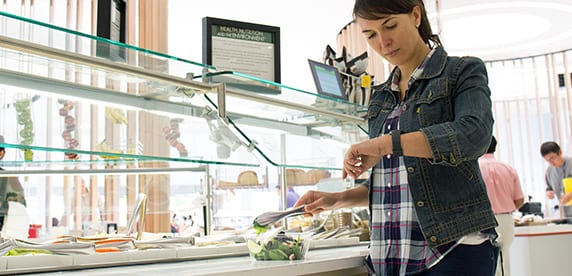Samsung and Nestlé announced the two companies are to collaborate on a new IoT health platform designed to advance digital health.
As the market for Internet of Things (IoT) starts maturing, an increasing number of collaborations between technology vendors and industrial actors across multiple vertical sectors are being announced. The new partnership between Korean electronics and network vendor Samsung and Switzerland-based food and beverage company Nestlé on a new IoT health platform is a perfect example of this evolution. The collaboration between Samsung Strategy and Innovation Center and Nestlé Institute of Health Sciences aims to provide new insights into healthy living by combining IoT, scientifically validated bio sensors, advanced multi-modal technology and nutrition science. “We are delighted to enter this collaboration with a global leader in the field of sensor technologies. It will advance our Nutrition, Health and Wellness strategy, to support people who want to live a healthier lifestyle,” said Stefan Catsicas, chief technology officer at Nestlé. The first pilots will begin in early 2017.
The new IoT health platform will provide end-users with contextual recommendations on nutrition, lifestyle, and fitness using Samsung’s ARTIK IoT platform as well as a global platform of smart device solutions. “We’re excited about the breakthroughs this collaboration will bring. Today, we live in an era of smarter living brought about by the convergence of technology and life science. It’s an era where the data from smart sensors and devices in our daily life such as mobile phones, wearables, and smart refrigerators can help us to understand our nutrition and activity and to guide us towards a healthier lifestyle,” said Young Sohn, president and chief strategy officer at Samsung Electronics.
Many established mobile health solutions geared towards nutrition or a healthy lifestyle have been initiated by tech startups, technology companies or sports equipment manufacturers, including applications or wearables developed by the likes of Lifesum, Fitbit or Nike. A change is underway as industrial companies start understanding the potential of IoT to enhance their core businesses. The IoT collaboration between Nestlé and Samsung is a logical step for Nestlé, which already today generates about 4 billion Swiss francs ($4.08 billion) within Health. Health is furthermore growing faster and more profitably than Nestlé’s traditional food and beverage businesses, according to Reuters. Globally, mobile health is expected to grow at a rapid pace. According to P&S Market Research, the global digital heath market accounted for revenue of $76,723 million in 2015. It is forecast to grow at a CAGR of 21.0 percent between 2015 and 2022. During the forecast period, the mobile health segment is expected to experience the fastest growth, at a CAGR of 34.0 percent globally.
IIoT News Recap: 14 Japanese companies team up on a virtual power plant experimental project; Malaysia’s Maxis to offer Vodafone’s IoT services to businesses; Apple’s car project to focus on self-driving tech, not cars; Chinese government bans road tests pending new self-driving regulation

Smart grid: 14 Japanese companies team up on virtual power plant experimental project
Fourteen Japanese companies are teaming up to launch the “Virtual Power Plant Experimental Project”. The project aims to bundle end-user devices scattered across power grids through the Internet of Things (IoT) to create a virtual power plant. The end game is about adjusting more effectively demand and supply to available capacity. The initiative is subsidized by the Agency for Natural Resources and Energy, an arm of Japan’s Ministry of Economy Trade and Industry, and is part of the government’s plan to rebalance Japan’s energy mix. The 14 companies taking part in the project are The Kansai Electric Power Company, Incorporated, Fuji Electric Co., LTD, Sansha Electric Manufacturing Co., Ltd, GS Yuasa Corporation, Sumitomo Electric Industries, Ltd., Nihon Unisys, Ltd., NTT Smile Energy, Ltd., Enegate Co., Ltd., ELIIY Power Co., Ltd., Obayashi Corporation, Kansai Electrical Safety Inspection Association, DAIHEN Corporation, Nature Japan Co., Ltd. and Mitsubishi Corporation.
IoT: Malaysia’s Maxis to offer Vodafone’s IoT services to businesses
Malaysian operator Maxis announced it is to offer Vodafone’s Internet of Things (IoT) services to businesses. “The exponential growth of data and how people use them has had a huge impact on how businesses operate. Through our agreement with Vodafone, which brings with it a global standard of service, unrivalled IoT experience and highly ranked by analysts, we are equipping businesses in Malaysia with more than just connectivity through our advanced data network, but a suite of IoT solutions to digitalise and transform their operations. This is a milestone in our drive towards new ways of working and digitalisation for enterprises,” said Shanti Jusnita Johari, Maxis head of Enterprise Marketing and Products.
Autonomous driving: Apple’s car project to focus on self-driving tech, not cars
Apple is reported to shift the focus of its self-driving project, dubbed Project Titan, from developing a self-driving car to developing an autonomous driving system, Bloomberg reports.
Autonomous driving: Chinese government bans road tests pending new self-driving regulation
Ford Motor’s joint venture partner Chongqing Changan Automobile announced it postponed public road tests in response to a regulatory ban by the Chinese government, China Daily reports. The government warned automakers against conducting public road tests before it issues guidelines for autonomous driving vehicles next month. But the Chinese automotive industry is worried drafting of the guidelines could be delayed. “I’m not optimistic about the rules coming out soon,” said Jia Xinguang, an analyst with the China Automobile Dealers Association.

